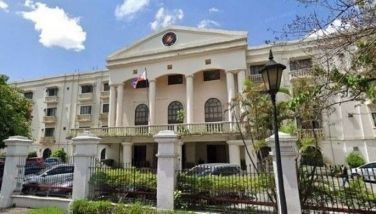Senate okays baselines bill
The Senate ratified yesterday the 2009 Baselines Bill to enable the country to beat the My 13 deadline of the United Nations Convention on the Law of the Sea (UNCLOS).
Voting 15-0, the Senate moved for the approval of the bill on third and final reading after Sen. Miriam Defensor-Santiago sponsored the committee report before the plenary.
“We have to pass this bill so as to meet the UN deadline of 13 May 2009. If we enclose in our archipelagic baselines the contested Spratly Islands and Scarborough Shoal, we achieve nothing, because no domestic law has the power to override international law,” Santiago said in her speech last Tuesday.
She said the Supreme Court might uphold the law if the baselines bill includes the contested islands inside the country’s archipelagic baselines, but an international court or tribunal will certainly reject it.
“The regime of islands principle adopted by the bill sufficiently protects our claim,” Santiago said.
The senator said there were three reasons why the bill adopted the “regime of islands principle.”
First, it has the advantage of avoiding conflicting base points with other claimants to the Spratlys. Second, it increases the size of the country’s archipelagic waters and EEZ (Exclusive Economic Zone) by 76,518 nautical miles.
And third, the bill did not deviate from the natural shape of the country’s archipelago and thus complied with UNCLOS Article 47, paragraph 3, which provides that “the drawing of such baselines shall not depart to any appreciable extent from the general configuration of the archipelago.”
The basic cause of conflict among claimant nations is the expectation that underneath the Spratlys seabed lie substantial deposits of oil, natural gas, minerals, and polymetals such as gold, silver, iron and nickel.
In the 1990s, the Philippines, China, and Vietnam had near skirmishes around Mischief Reef, Santiago noted.
She added that the Philippines, Brunei-Darrusalam, Indonesia, Malaysia, Singapore and Thailand signed the ASEAN Declaration on the South China Sea to avert a military crisis in the Spratlys.
Ten years later, the ASEAN governments and China signed the 2002 ASEAN-China Declaration of Parties in the South China Sea.
This declaration maintained the status quo and temporarily suspended issues of ownership, thus reducing tension among the claimant states.
She explained that the continental shelf, which is the underwater natural prolongation of a land territory, is measured from the baseline.
Under international law, Santiago defined the baseline as “the line that divides the land from the sea, by which the extent of a state’s coastal jurisdiction is measured.”
“Hence, unless we pass a new baselines law, our present law will not be UNCLOS-compliant. No modern baselines law, no extended continental shelf,” Santiago said in her sponsorship speech.
The present baselines law amends prior laws that are not UNCLOS-compliant; establishes a new baseline which serves as official notice to all states of the extent of the limits of Philippine maritime zones; and includes a “no prejudice” clause in section 3 which provides that: “This act shall be without prejudice to Philippine dominion and sovereignty over all portions of the national territory as defined under Article 1 of the Constitution.”
- Latest
- Trending





























